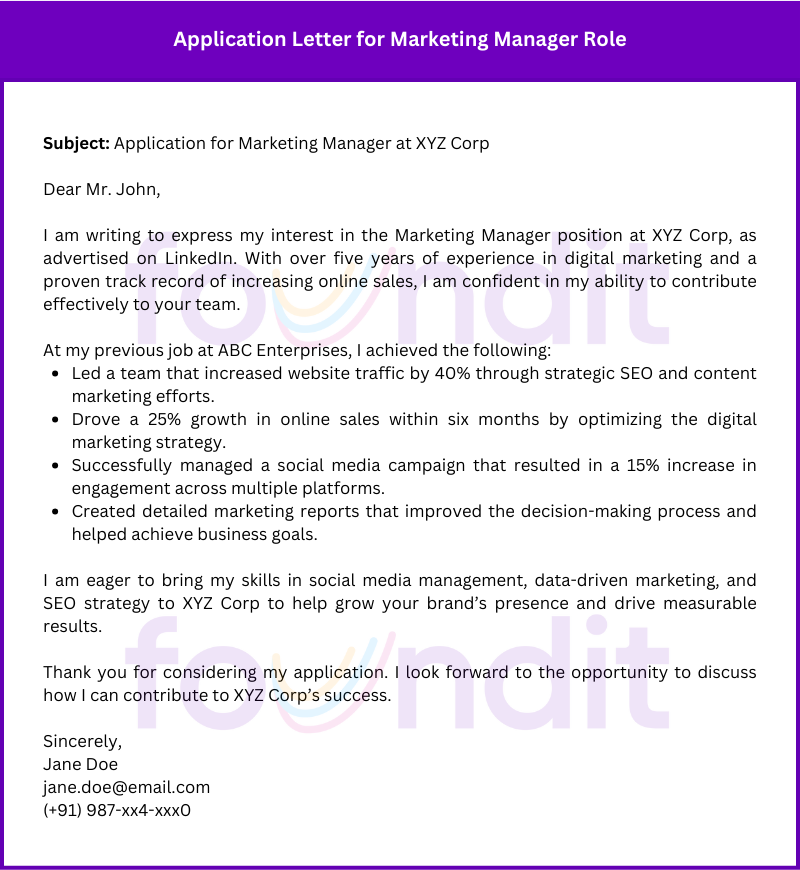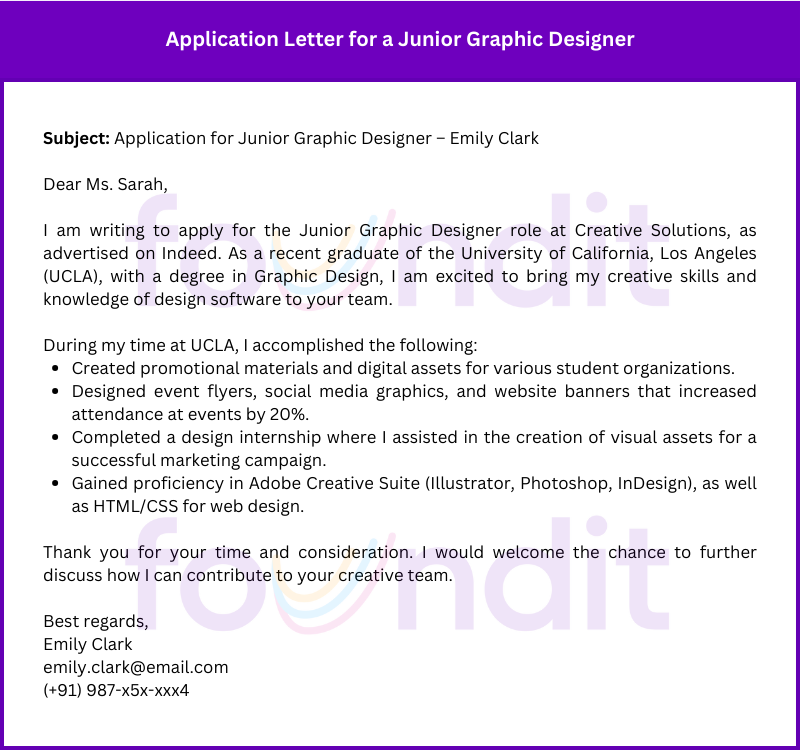Part of the process of applying for a position is your job application letter or cover letter, as it is popularly known.
We’ve already mentioned the merits of having a one-page, crisp resume, but even before the hiring manager opens the attachment, your job application email in recent times, offers the first glimpse of your profile.
Here’s how you can write an effective job application that will grab eyeballs and make the hiring manager hit the reply button even before opening your resume.
To write an effective job application letter, you need answers to the following questions:
1. Why Are You Writing?
The introduction in your cover letter for job application should set your intent for writing in the first place. While the subject will mention the purpose, the reference to an advertisement, social media post, or even a conversation with a common acquaintance will get the HR manager’s attention. Bear in mind that your cover letter is for introducing your profile so compellingly that the recipient feels the need to see more of who you are and pick up the phone to fix an interview appointment at the earliest.
Where the resume is a series of chronological bullet points, your cover letter is a chance for you to get descriptive. Your job application letter is a great opportunity to express your motivations and interest in the role.
2. What Should It Look Like?
Well, for beginners, it should be legible, well-formatted, and clean. The easiest way to achieve this, if you have to send a hard copy, is to type it out and then print it. Keep it short and of course, if you’re sending it on email, it shouldn’t be longer than three short paragraphs.
Make sure to follow a job application letter format that aligns with industry standards.
You May Also Like: Resume Template Examples and Writing Tips
3. What Should It Contain?
Make sure your job application letter includes glimpses into your resourcefulness. This will demonstrate how you can help the company achieve its goals. The relevant skills and capabilities you possess for the role and organisation should be evident instantly when the recruiter reads your application letter for the job. If you can put facts and figures to your achievements, include them to make the case even more compelling for the hirer.
If you are sending a job application letter with resume, make sure to clearly mention that the resume is attached. You can also include a job application letter template for easier reference.
In a hard copy, your contact details – phone, address as well as email id – are all important inclusions. Be sure to add references but only once you’ve checked with the individuals for consent to do the same.
4. Who Are You Writing To?
Whether you’re writing to the CEO directly, an HR executive within the company, or a department head – be mindful of who you are writing to and customise your application letter for the job appropriately. Also, take into consideration the industry, competition of the company, the department you are likely to be part of, and the size of the company.
5. What to Avoid in Your Job Application Letter
Once you answer the above questions, you are ready to roll but make sure you avoid the following.
- Don’t summarise or repeat lines from your resume: If it was your resume that the recruiter preferred to read directly, she or he would do so – don’t repeat entire lines or sections from your resume on your cover letter. Explain your achievements and outcomes through examples or numbers. Since you aren’t constrained by the format of bullet points, you can explain it with clarity.
- This isn’t the time or place to mention remuneration expectations: Your cover letter or application mail is the first instance when you are opening the conversation about your intent to take on the position. It’s a space in which you pique the recruiter’s interest and prove your mettle. Once you’ve whetted their appetite, only then can you graduate to the money talk. Your application letter is no place to discuss remuneration. It is also an unwritten negotiation rule to not make the first move on the salary topic.
- Don’t showcase your Primary School Achievements: If you’re a fresher, you may be tempted to mention all your achievements – even when you were selected Sports Captain or won an inter-house debate competition in class 5th. Those are not relevant to your job and take up unnecessary real estate on your resume.
- Refrain from using colloquialisms: If you’re applying to a young startup or a long-standing corporation, a bank or an advertising agency, in which geography – these are just some of the elements that will determine how casual or formal your application letter for the job will be. Make sure you look up the company’s website for inspiration and have your letter proofread and looked over by an experienced person to avoid any errors.
People Also Read: How to Write a Resume for Job
Job Application Letter Template
| Dear [Recipient’s Name], I am writing to apply for the [Job Title] position at [Company Name], as advertised on [Where you found the job posting]. I believe my [mention key experience or skills] make me an excellent fit for this role. At [Previous Company], I [mention relevant achievements and responsibilities]. I am confident that my experience in [mention relevant field/industry] will allow me to add value to your team and contribute to the success of [Company Name]. I would appreciate the opportunity to discuss my qualifications in more detail. Please find my resume attached for your review. Thank you for your time and consideration. Sincerely, [Your Name] [Contact Information] |
Job Application Letter Samples
Below are some examples of job application letters to guide you. You can personalize them according to your own experience.
Sample 1: Application Letter for Marketing Manager Role
| Subject: Application for Marketing Manager at XYZ Corp Dear Mr. John, I am writing to express my interest in the Marketing Manager position at XYZ Corp, as advertised on LinkedIn. With over five years of experience in digital marketing and a proven track record of increasing online sales, I am confident in my ability to contribute effectively to your team. At my previous job at ABC Enterprises, I achieved the following: – Led a team that increased website traffic by 40% through strategic SEO and content marketing efforts. – Drove a 25% growth in online sales within six months by optimizing the digital marketing strategy. – Successfully managed a social media campaign that resulted in a 15% increase in engagement across multiple platforms. – Created detailed marketing reports that improved the decision-making process and helped achieve business goals. I am eager to bring my skills in social media management, data-driven marketing, and SEO strategy to XYZ Corp to help grow your brand’s presence and drive measurable results. Thank you for considering my application. I look forward to the opportunity to discuss how I can contribute to XYZ Corp’s success. Sincerely, Jane Doe jane.doe@email.com (+91) 987-xx4-xxx0 |

Sample 2: Application Letter for a Job (Entry-Level)
| Subject: Application for Junior Graphic Designer – Emily Clark Dear Ms. Sarah, I am writing to apply for the Junior Graphic Designer role at Creative Solutions, as advertised on Indeed. As a recent graduate of the University of California, Los Angeles (UCLA), with a degree in Graphic Design, I am excited to bring my creative skills and knowledge of design software to your team. During my time at UCLA, I accomplished the following: – Created promotional materials and digital assets for various student organizations. – Designed event flyers, social media graphics, and website banners that increased attendance at events by 20%. – Completed a design internship where I assisted in the creation of visual assets for a successful marketing campaign. – Gained proficiency in Adobe Creative Suite (Illustrator, Photoshop, InDesign), as well as HTML/CSS for web design. Thank you for your time and consideration. I would welcome the chance to further discuss how I can contribute to your creative team. Best regards, Emily Clark emily.clark@email.com (+91) 987-x5x-xxx4 |

Conclusion
Writing a strong application letter is an essential part of the job application process. By following the proper letter format, showcasing your relevant skills and achievements, and tailoring your letter to the specific role and company, you can increase your chances of landing an interview. Keep your tone professional, avoid unnecessary details, and make sure your letter is both clear and compelling.
A well-written application letter can make a strong first impression and set you apart from other candidates.
People Are Also Interested In:
FAQs on Writing an Application Letter
Q1. How long should my job application letter be?
A1. A job application letter should be concise—ideally one page, with around three short paragraphs. Keep it clear and direct. How to write an application letter for a job is all about striking the right balance.
Q2. Can I use a template for my job application letter?
A2. Yes! Job application letter templates are great starting points, but always personalize them. Tailor your letter to highlight your relevant experience, skills, and the specific job position you’re applying for to make it stand out.
Q3. Should I mention salary expectations in my job application letter?
A3. It’s best to avoid mentioning salary expectations in your application letter for the job. Focus on your qualifications and fit for the role. Salary expectations can be discussed later in the interview process.
Q4. How can I make my job application letter stand out?
A4. To stand out, use specific examples of your achievements and action verbs. Personalize your job application letter to the company and the role, showing you’ve done your research. Tailoring it to the job will make a bigger impact.
Q5. How do I address a job application letter?
A5. Always address your job application letter to the right person, such as the hiring manager. If unsure, “Dear Hiring Manager” is a safe option. Personalizing your greeting by finding the hiring manager’s name adds a personal touch.
Job By Role:




